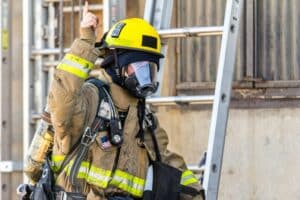First responders, including firefighters, police officers, paramedics, and emergency medical technicians (EMTs), face unique challenges in their professions. They are often the first on the scene in life-threatening or dangerous situations, making split-second decisions that can mean the difference between life and death. While these roles are crucial for public safety, they come with significant stress. This stress, if left unmanaged or relieved, can lead to severe mental, physical health, and relationships issues in life. This blog post explores first responder stress, ways to bring understanding to the challenges they face, and helps to find solutions for this population.
Understanding First Responder Stress
First responder stress stems from various factors, including exposure to traumatic events, high-stakes decision-making, life and death situations, and the need to maintain composure under pressure. Repeated exposure to traumatic incidents such as auto accidents, fires, violent crimes, domestic violence, and medical emergencies can lead to chronic stress within the body, anxiety and edginess, and even Post-Traumatic Stress Disorder (PTSD). Unlike the average person, first responders witness human suffering and tragedy at higher levels of frequency than the public. Furthermore, this frequency can even numb one’s bodily responses to emotion and trauma. If not addressed, the first responder can then lose their ability to connect with others and themselves later in life.
One major contributor to first responder stress is the unpredictability of their work. Each shift may involve long hours, exhaustion, physically demanding tasks, and emotionally charged situations. Over time, the constant state of alertness can lead to fatigue and burnout. Additionally, the nature of their jobs often isolates first responders from their families, communities, and support networks, which can create a sense of loneliness.
Signs of Stress Among First Responders
Every person is different and stress among first responders can manifest in various ways. Common symptoms include anxiety, irritability, difficulty sleeping, muscle tension, and physical body aches. Behavioral changes such as increased use of alcohol or other substances, changes in sleep patterns, or shifts in appetite may also indicate that a first responder is struggling with stress. If left unchecked, chronic stress can lead to more serious conditions, including depression, substance abuse, suicidal thoughts, or medical challenges later in life.
Strategies for Managing First Responder Stress
Given the high levels of stress that come with being a first responder, it’s crucial to have strategies in place for managing it.
- Mental health check-ins – these can be with friend, family, or social groups
- Peer support programs – forming social networks with others in similar occupations can create a sense of cohesion
- Exercise and physical activity – sometimes our bodies need outlets for stress. Both of these options are great to release emotions and tension in the body
- Hobbies – finding joy in activities can be a great way to pursue one’s values
- Mindfulness and relaxation techniques – these skills can be used to help regulate emotions, manage stress, and increase nervous system regulation
- Use of PTO – this can be a great way to spend time with loved ones and do things you enjoy
Nervous System Flexibility
When working with first responders the goal of therapy is to increase nervous system flexibility and process and integrate past traumatic events. After exposure to trauma and high-stress situations, a person’s nervous system can become dysregulated and stuck. Often, this means working through symptoms of numbness, guilt, shame, and/or embarrassment. However, each person is unique and brings their own personal history to the therapy session. Trauma therapy will help to regulate the nervous system and heal the body from past trauma.
Stigma Among First Responders
It’s important to ask for help. However, in the first responder realm, asking for help can appear weak or soft. It’s important to address these factors upfront. First, therapy is confidential. There are only a few instances when confidentiality can be broken. Secondly, imagine the courage it takes to ask for help and how this can be used to help those around you. Lastly, think about how your life can change for the better and what it would be like to live life not weighted down by past stressful events.
EMDR Trauma Therapy for First Responders Near Racine, WI
Trauma therapy can help first responders heal from the stress of their occupation. Healing the mind and body to improve mental health symptoms and the quality of one’s life is possible. At Revitalize Mental Health PLLC, we offer Eye Movement Desensitization and Reprocessing (EMDR) therapy to help first responders heal. The grit first responders needto show up to their jobs every day will be a tailwind in our work together. Let’s use it. Daniel Gospodarek can be reached at 720.295.6703 or by submitting an online form here.





